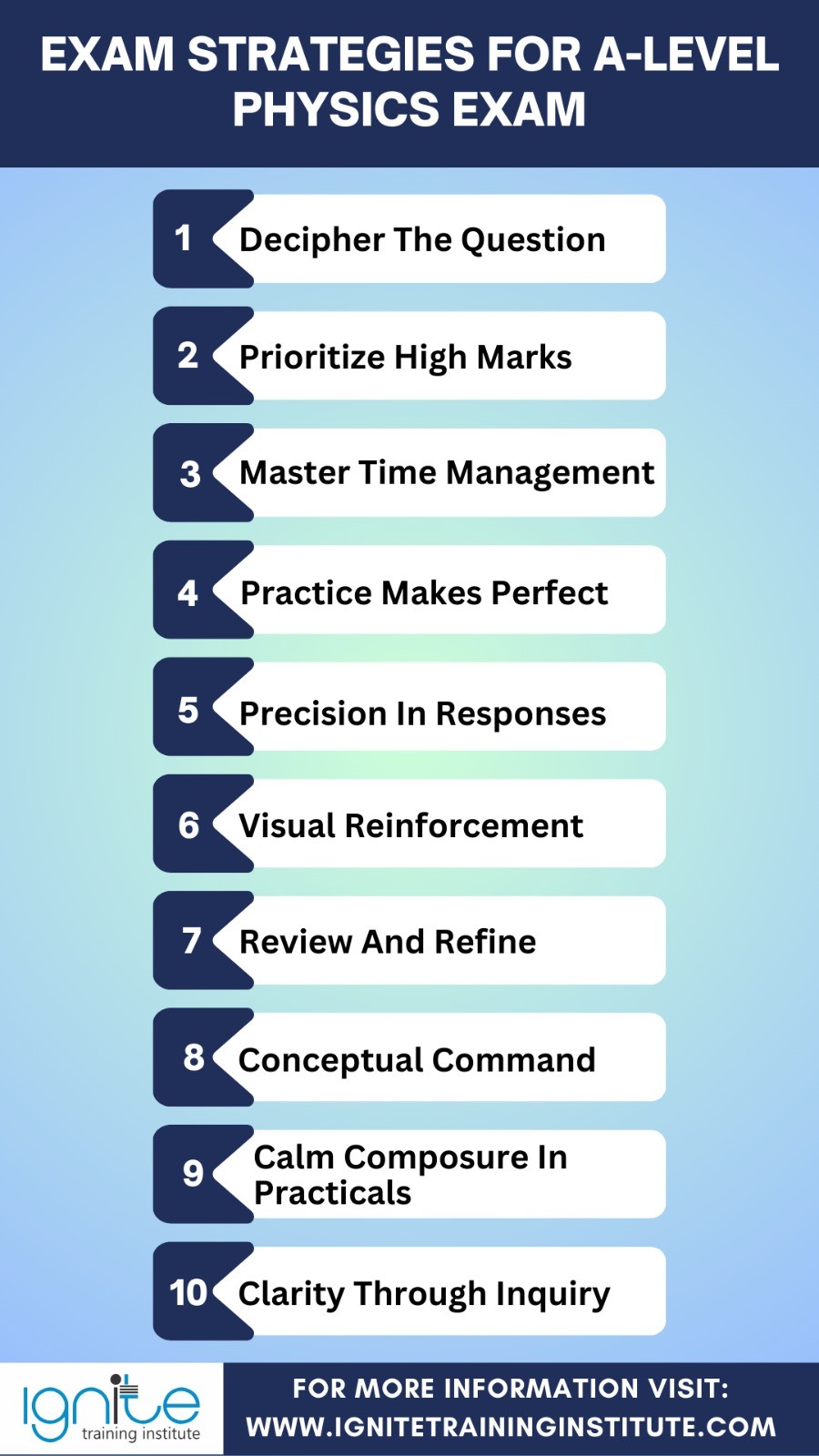The A-Level Physics course stands as a gateway to unraveling the mysteries of the physical world, providing students with a comprehensive understanding of fundamental principles and theories that govern our universe. This academic journey delves into the realms of mechanics, thermodynamics, electricity, magnetism, waves, and particle physics, fostering a deep appreciation for the intricacies of the natural sciences.
Ignite Training Institute is at the forefront of empowering students on this academic expedition, where excellence meets education. Offering dedicated tutoring for A-level physics and an array of other A-level subjects, Ignite stands as a beacon for those seeking personalized guidance and mentorship.
What Is An A-Level Physics Course?
An A-level physics course is a challenging yet immensely rewarding academic journey that delves deep into the fundamental principles governing the physical world. Aimed at post-16 students, A-Level Physics is a two-year program designed to provide a comprehensive understanding of the laws that govern matter, energy, and the forces shaping our universe. This advanced level of study builds upon the foundation laid during GCSEs, offering students an opportunity to explore intricate topics such as mechanics, electricity, magnetism, thermodynamics, waves, and particle physics.
At the heart of the A-level physics curriculum lies a commitment to fostering critical thinking, analytical skills, and a profound curiosity about the natural world. The course typically comprises core modules covering the essential concepts, along with optional modules that allow students to tailor their learning experience to specific areas of interest, such as astrophysics, medical physics, or engineering.
Related: Top 10 A-Level Schools In Dubai: Recent Reviews & Insights
Exam Boards & Varied Perspectives
A distinguishing feature of A-level physics is the diversity of exam boards offering the course, each providing a unique perspective and assessment structure. Prominent exam boards such as AQA, Edexcel, OCR, and Cambridge International bring their flavor to the curriculum, ensuring students have a range of options to choose from based on their academic preferences and goals. AQA emphasizes practical skills and application of knowledge, while Edexcel focuses on problem-solving and mathematical fluency. OCR integrates practical work with theoretical understanding, and Cambridge International offers a global perspective, recognizing the course’s international relevance.
In the pursuit of academic excellence, students are not merely preparing for exams; they are embarking on a journey to comprehend the intricacies of the universe. A-level physics equips them with the skills and knowledge necessary for further study in physics-related disciplines at the university level. It opens doors to diverse career paths, from engineering and research to medicine and beyond.
Related: A-Level Arts Subjects: A Guide To Choosing Class 11 Subjects
Course Structure Of A-Level Physics CIE
The A-Level Physics course offered by Cambridge International Examinations (CIE) unfolds as a captivating exploration into the fundamental principles that govern the physical world. Designed to inspire curiosity and nurture analytical thinking, the CIE A-Level Physics curriculum spans a range of engaging topics, providing students with a comprehensive understanding of classical and modern physics.
Core Modules
Module 1: Mechanics
Kinematics, forces, energy, and momentum form the building blocks, offering insights into the fundamental principles of classical mechanics.
Module 2: Electricity & Magnetism
This module delves into the intricacies of electric and magnetic fields, capacitance, inductance, and electromagnetic induction, unraveling the mysteries of electricity and magnetism.
Module 3: Waves & Oscillations
Exploring the nature of waves and oscillations, this module covers wave properties, interference, diffraction, and the principles governing oscillatory motion.
Module 4: Thermal Physics
Understanding the behavior of matter at different temperatures, including concepts like thermal equilibrium, ideal gases, and heat transfer, provides a foundation for comprehending thermal physics.
Module 5: Nuclear & Particle Physics
Optional Modules
Students further tailor their A-level physics journey by selecting two optional modules from a range of captivating choices:
Module 6: Astrophysics
Module 7: Medical Physics
Module 8: Engineering Physics
Module 9: Turning Points in Physics
Module 10: Electronics
Assessment Overview
Paper 1: Modules 1-5: Written examination, 1 hour 45 minutes, 30% of the total marks
Paper 2: Modules 1-5: Written examination, 1 hour 45 minutes, 30% of the total marks
Paper 3: Modules 6-10: Written examination, 1 hour 45 minutes, 40% of the total marks
Practical Assessment: Assessment of practical skills, assessed by teachers, reported separately
Related: A-Level Subjects For Psychology: Ideal Subject Combinations
Course Structure Of A-Level Physics AQA
The A-Level Physics course offered by the AQA examination board is designed to provide students with a deep and comprehensive understanding of the fundamental principles that govern the physical world. This advanced level of study is typically undertaken by students in the final two years of their secondary education (Year 12 and Year 13 in the UK). The course is structured to cover a broad range of topics, fostering both theoretical knowledge and practical skills. Below is an overview of the course structure for A-Level Physics by AQA:
Year 12: AS Level
Unit 1: Measurements & Their Errors
- Introduction to units and measurements.
- Precision, accuracy, and errors in measurements.
- Scientific notation and significant figures.
Unit 2: Particles & Radiation
- Particle physics and the Standard Model.
- Quantum phenomena.
- Nuclear physics and radiation.
Unit 3: Waves
- Properties of waves.
- Behavior of waves.
- Superposition of waves.
Unit 4: Mechanics & Materials
- Kinematics and dynamics.
- Forces and motion.
- Materials, elasticity, and fluid dynamics.
Year 13: A-Level
Unit 5: Electricity
- Electric circuits.
- Resistance and Ohm’s Law.
- Capacitance and electromagnetism.
Unit 6: Further Mechanics & Thermal Physics
- Circular motion and oscillations.
- Thermodynamics and ideal gases.
- Statistical mechanics.
Unit 7: Fields & Their Consequences
- Gravitational and electric fields.
- Magnetic fields.
- Particle physics and astrophysics.
Unit 8: Nuclear Physics
- Nuclear decay.
- Nuclear reactions.
- Applications of nuclear physics.
Assessment
The AQA A-Level Physics course is assessed through written examinations, which include a mix of multiple-choice questions, short answer questions, and more extended responses. Practical skills are also assessed through a separate endorsement, based on students’ performance in laboratory work and their ability to analyze and evaluate experimental data.
Related: AQA VS CIE: A Closer Look Into The Examination Boards
Course Structure Of A-Level Physics Edexcel
The A-Level Physics course offered by Edexcel is designed to provide students with a thorough understanding of fundamental principles in physics. The Edexcel A-Level Physics course is structured to cover a range of topics, combining theoretical knowledge with practical applications.
Course Modules
Unit 1: Mechanics & Materials
Unit 2: Waves & Electricity
Unit 3: Practical Skills In Physics I
Unit 4: Further Mechanics, Fields & Particles
Unit 5: Thermodynamics, Radiation, Oscillations and Cosmology
Unit 6: Practical Skills In Physics II
Assessment
Paper 1: Advanced Physics I
Duration: 1 hour 45 minutes
Weighting: 30% of total A-Level
Marks: 90 Marks
Content:
Section A: Core content covering topics from Units 1, 2, and 3.
Section B: Short and long answer questions based on practical skills.
Paper 2: Advanced Physics II
Duration: 1 hour 45 minutes
Weighting: 30% of total A-Level
Marks: 90 Marks
Content:
Section A: Core content covering topics from Units 4, 5, and 6.
Section B: Short and long answer questions based on practical skills.
Paper 3: General and Practical Principles in Physics
Duration: 2 hours 30 minutes
Weighting: 40% of total A-Level
Marks: 120 Marks
Content:
Section A: Questions based on practical skills and data analysis.
Section B: Extended response questions covering content from any part of the specification.
Related: What Is AQA GCSE: A Detailed Overview For Students & Parents
Exam Strategies For A-Level Physics Exam

Facing the challenges of A-level physics exams requires more than just knowledge; it demands strategic prowess. Here are ten crucial exam strategies to guide you toward a stellar performance:
- Decipher The Question: Begin by carefully deciphering each question to grasp the precise requirements before crafting your response.
- Prioritize High Marks: Kickstart your exam by tackling questions with higher mark allocations to secure essential points swiftly.
- Master Time Management: Skillfully manage your time, ensuring a balanced approach to all questions to avoid leaving any stone unturned.
- Practice Makes Perfect: Hone your skills by practicing with past papers regularly, acclimating yourself to the exam format, and refining your answering technique.
- Precision In Responses: Craft clear and concise responses, directly addressing the core of each question and avoiding unnecessary embellishments.
- Visual Reinforcement: Elevate your answers by incorporating relevant diagrams and formulas where applicable, reinforcing the clarity of your explanations.
- Review And Refine: Allocate time at the end to review and refine your answers, correcting errors and adding valuable details if time allows.
- Conceptual Command: Focus on mastering fundamental concepts, and understanding the underlying principles rather than relying solely on rote memorization.
- Calm Composure In Practicals: Maintain a calm demeanor during practical assessments, following instructions meticulously and recording observations accurately.
- Clarity Through Inquiry: When faced with unclear questions, don’t hesitate to seek clarification to ensure you’re addressing what is precisely asked.
Related: Guide To A-Levels Subjects For Different Career Options
Ignite Training Institute – Best A-Level Physics Course Tutoring
Ignite Training Institute offers tutoring for A-level physics courses to provide students with a robust understanding of the subject. The program covers fundamental concepts, advanced theories, and practical applications, led by experienced instructors in a state-of-the-art facility. With a focus on fostering critical thinking and problem-solving skills, the institute prepares students for A-level examinations and future endeavors in scientific disciplines.
Related: A-Levels VS CBSE: Comparing World’s Top Education Systems
FAQs
1. What Is The A-Level Course Of Physics?
The A-Level Physics course is an advanced academic program covering fundamental and advanced concepts in physics, designed for students typically in their final years of secondary education.
2. Is A-level Physics Very Hard?
The difficulty of A-level physics varies among students, but it is generally considered challenging due to its complex concepts and analytical nature.
3. Is Physics A-Level Useful?
Yes, Physics A-Level is highly useful as it develops critical thinking and problem-solving skills, and provides a strong foundation for further studies and careers in scientific and engineering fields.
Conclusion

In conclusion, the A-level physics course is a gateway to a profound understanding of the physical world, fostering critical thinking and problem-solving skills. Ignite Training Institute’s comprehensive program not only prepares students academically but also instills a lasting passion for physics. As students conclude this educational chapter, they carry with them not just a qualification but a foundation that fuels curiosity and a lifelong appreciation for the wonders of physics.
Related: 5 Differences Between GCSE & A-Levels: Facts To Know


